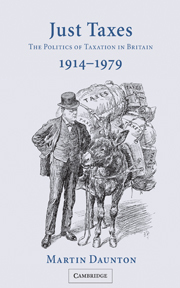Book contents
- Frontmatter
- Contents
- List of figures
- List of tables
- Preface
- List of abbreviations
- 1 The taxing state: an introduction
- 2 ‘The limits of our taxable capacity’: war finance, 1914–1918
- 3 ‘This hideous war memorial’: debt and taxation, 1918–1925
- 4 ‘Adjusting the particular turns of the different screws’: reforming the income tax, 1920–1929
- 5 ‘The great conflict of modern politics’: redistribution, depression and appeasement, 1929–1939
- 6 ‘The exigency of war’: taxation and the Second World War, 1939–1945
- 7 ‘The mortal blows of taxation’: Labour and reconstruction, 1945–1951
- 8 ‘A most injurious disincentive in our economic system’: Conservatives and taxation, 1951–1964
- 9 ‘Modern and dynamic economic policy’: Labour and taxation, 1951–1970
- 10 Rethinking taxation policy: from an opportunity state to an enterprise society, 1964–1979
- 11 ‘Highly defensible ramparts’: the politics of local taxation
- 12 Conclusion
- Appendix: chancellors of the Exchequer and prime ministers, 1908–1983
- Bibliography
- Index
4 - ‘Adjusting the particular turns of the different screws’: reforming the income tax, 1920–1929
Published online by Cambridge University Press: 23 December 2009
- Frontmatter
- Contents
- List of figures
- List of tables
- Preface
- List of abbreviations
- 1 The taxing state: an introduction
- 2 ‘The limits of our taxable capacity’: war finance, 1914–1918
- 3 ‘This hideous war memorial’: debt and taxation, 1918–1925
- 4 ‘Adjusting the particular turns of the different screws’: reforming the income tax, 1920–1929
- 5 ‘The great conflict of modern politics’: redistribution, depression and appeasement, 1929–1939
- 6 ‘The exigency of war’: taxation and the Second World War, 1939–1945
- 7 ‘The mortal blows of taxation’: Labour and reconstruction, 1945–1951
- 8 ‘A most injurious disincentive in our economic system’: Conservatives and taxation, 1951–1964
- 9 ‘Modern and dynamic economic policy’: Labour and taxation, 1951–1970
- 10 Rethinking taxation policy: from an opportunity state to an enterprise society, 1964–1979
- 11 ‘Highly defensible ramparts’: the politics of local taxation
- 12 Conclusion
- Appendix: chancellors of the Exchequer and prime ministers, 1908–1983
- Bibliography
- Index
Summary
Pressing as was the need for reform before the war it is even more imperative now. Taxation has so greatly increased since 1914 that it is more than desirable, it is vital to our country's future, that now, when the national burden is at its heaviest, it shall be fairly distributed, and the individual share fitted with sympathy and with discrimination to the back that will for many years have to bear it.
PP 1920 xviii, Report of the Royal Commission on the Income Tax, p. 107The doctrine of ability to pay, worked on no definite principle except perhaps political pressure, may become a gigantic instrument of doles … The doctrine of ability to pay would, if carried to its logical conclusion, resolve itself into a series of hidden subsidies in the shape of allowances given by rule of thumb to certain favoured classes.
Lillian Knowles, PP 1920 xviii, Report of the Royal Commission on the Income Tax, p. 257Since its reintroduction in 1842, the income tax evolved through small-scale adjustments designed to meet political and financial exigencies. Thus differentiation, graduation and child allowances were grafted on to a different system based on abatements from the standard rate of tax, without rethinking the income tax as a whole. Reform was imperative when tax rates rose during the war and more people became liable. In 1919, the coalition government responded by appointing a Royal Commission to undertake the first survey of the income tax as a whole since 1842.
- Type
- Chapter
- Information
- Just TaxesThe Politics of Taxation in Britain, 1914–1979, pp. 103 - 141Publisher: Cambridge University PressPrint publication year: 2002



